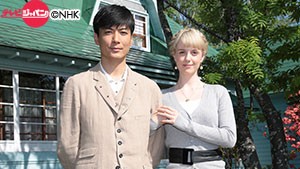1. When you’re looking for somewhere to live in Tokyo it’s always better to share an apartment with a Japanese person rather than seeking out gaijin (foreigner) share houses, if you want to improve your Japanese language skills. Although a Japanese person, who is willing to share their apartment with a foreigner, might be hoping to improve their English, you should still have plenty of opportunities to improve your Japanese language skills if you choose to live with someone who has limited English skills. You can suggest a plan to speak only in Japanese for two weeks and in English for the other two weeks in a month if you decide to live together.
2. Watch television for at least one hour every day. If you’re planning to live in Japan, you have probably already studied Japanese at school or university in your home country or you’ve taken the time to learn Japanese by yourself in preparation for your stay in Tokyo. If you dedicate time to watching television in Japan you’ll slowly pick up more and more vocabulary. I suggest you tune in to melodramatic and romantic dramas – they are easy to follow and the plots in these dramas usually unfold very slowly. You can prepare for your trip in your home country before you leave for Japan by watching some of these Japanese dramas on your PC for free.
A drama that was very popular on NHK Television in Japan is called “Massan”. This particular drama received a lot of attention from the international community in Japan, mainly because the lead actress is an American woman. Her name is Charlotte Kate Fox. Charlotte plays a Scottish woman in “Massan” called Ellie Kameyama, a fictional character based on a real-life Scottish woman called Jessie Roberta “Rita” Cowan who traveled to Japan circa 1920. Ellie’s husband in the series is Masaharu Kameyama played by Tetsuji Tamayama. This drama is a fictionalized account of when the couple met and the husband’s endeavours to build his business – the Nikka Whiskey Distilling company. Although Charlotte Kate Fox did not understand or speak Japanese as a second language when she accepted the role, she began speaking Japanese in the drama by memorizing the sound of each Japanese word. Despite the language barrier, Charlotte has received positive reviews for her portrayal of the character Ellie. Maybe you can tune in to this drama when you’re in Japan. Not only will you be learning Japanese while you watch, you’ll also be able to chat about this very topical and much talked about drama with your Japanese friends or when you meet other foreigners.
3. Many foreigners try and save as much money as they can when they work in Japan so many people end up buying quick and easy meals from convenience stores. This is because they are cheap and these shops often have a huge and tempting selection. The problem with this is that you can become isolated and lonely eating these meals by yourself back at your apartment if you live alone. Instead, you should find your local yakitori (grilled chicken) bar or even yatai (mobile food station). You will not seem out of place sitting there by yourself and you’re not expected to drink alcohol so don’t worry about hangovers when you have to work the next day. Non-alcoholic Mugi cha (barley tea) and Oolong tea are often served at these places and the food is generally very cheap. The atmosphere at yakitori bars and yatai food stations is also nearly always lively and welcoming. If you visit these places once or twice a week, you’ll get to know the people who work there and the regulars and you’ll be having conversations with them in no time.
4. Many foreigners date Japanese people when they live in Japan and this nearly always helps improve their Japanese skills. However, men should be careful they don’t start picking up female speech. There are lots of Japanese words only spoken by women and of course there are also masculine words spoken only by men. Therefore it’s important to differentiate between female or male Japanese and standard, polite and honorific Japanese. You should also be careful not to learn lots of Japanese slang and later try this out on your Japanese managers at work because this may come across as being extremely rude and inappropriate.
5. There are many cultural and art and craft groups all over Tokyo. Find out where you can join a class and learn new and culturally-appropriate skills in your local area like Ikebana (flower arrangement), Tea Ceremony, shodo (Japanese calligraphy), kendo (a Japanese martial art that uses bamboo swords) or musical instruments like the shamisen. More often than not the teacher will only speak Japanese but most teachers will go to a lot of effort to help you learn by using simple Japanese words or they’ll take the time during the lesson to show you how to learn by example. These classes are also great places to meet the locals and talk with interesting Japanese women or men while you learn a new skill together.
6. Make friends with your students if you’re an English teacher in Tokyo and arrange to go out for coffee with them or ask them to show you around Tokyo. Explain to these pupils that you would prefer to speak Japanese outside the classroom.
7. Find out about homestay experiences. You can improve your Japanese and learn a lot about Japanese customs even if you just spend a weekend with a Japanese family. Companies like Homestay in Japan!! will organise all this for you.
8. Travel around Japan and stay in Japanese ryokans (inns) on the weekend or when you take a week off from work. You will notice the different dialects when you travel to different parts of the country and you’ll learn greetings and polite Japanese from your hosts at the ryokans. These hosts will go to a lot of trouble to provide you with everything you need for your stay in simple but polite Japanese and you will not feel that you are misunderstood as the proprietors at these inns are used to having foreign guests at the more popular tourist destinations all over Japan.
















2 Comments
Spot-on advice!
For advanced Japanese language students, another great way to study the language is through rakugo (落語: classic Japanese comic storytelling). It’s much easier to absorb vocabulary when it’s presented in the context of a story. And you learn the language from MASTER storytellers. Can’t think of a better source to emulate than the rakugoka…not to mention humor offers a deeper glimpse into culture and humanizes the Japanese all in one shot. (Contrary to popular myth the Japanese have a GREAT sense of humor.) I had the good fortune to watch many taped performances with a very patient native speaker (um, my wife) who clued me in on the jokes and vocabulary. After numerous times listening to any given story, it’s amazing what I retain.
Fortunately any rakugo performances are now on youtube. My favorite storyteller was the late Kokontei Shincho because not only was he a master at his craft, but also his Japanese was crystal clear, even to gaijin ears. (btw, my senior thesis in college was “Death-Related Humor in Rakugo”) 🙂
An excellent recommendation – thanks Tim!